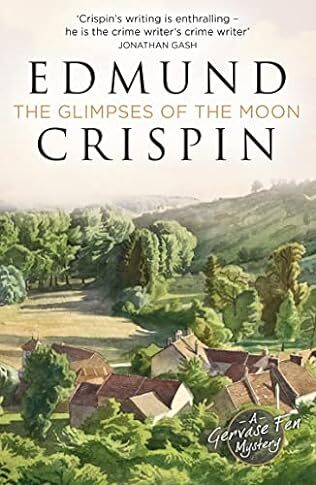The Glimpses Of The Moon

A review of The Glimpses of the Moon by Edmund Crispin – 240612
Originally published in 1977, a year before his death, The Glimpses of the Moon is the ninth and last in Edmund Crispin’s Gervase Fen series and appeared twenty-six years after his previous Fen novel, The Long Divorce. It is a long, sprawling, Rabelaisian sort of novel that gives the impression that the author had lots of material that he was desperate to use come what may. It is also extremely funny and somewhere hidden inside is a murder mystery of sorts.
There are three murders, the details of the first of which we are drip fed until Fen is intrigued enough to read the newspaper accounts of the slaying of Routh eight weeks earlier. It is a gruesome killing with the head severed and limbs amputated. The police have held a man called Hagberd, who objected to Routh’s bouts of animal cruelty but the consensus of the locals is that he is innocent. Then there is the murder of Mavis Trent and then the discovery of a one-armed headless body in a marquee at the village fete. Add in a larger than life Amazonian called Ortrud Youings, a brother who miraculously arrives out of nowhere, and a peculiar spot of blackmail where the victim of one blackmail plot blackmails another and you have the bare bones of the plot.
Fen is more of an observer than an active sleuth, but he does give a tip off to Inspector Widger, albeit off-stage, that enables him to solve the conundrum of how a severed arm could have been taken out of the marquee unobserved. The answer, of course, lays bare a fundamental misconception, what Fen calls the Chesterton Effect. While the murderers are unmasked, you quickly get the sense as you immerse into Crispin’s world that they are purely incidental and that you should revel in the madness that his fertile imagination conjures up.
There are so many wonderful images and episodes. In 1991 when I was in Valparaiso I got into conversation with an old man in my pidgin Spanish who was guarding a bulging plastic bag which he told me contained a sheep’s head he was going to boil up. If I had read this book then I might have wondered whether it was really the head of a murder victim which Fen had mistakenly picked up and carried around all day, thinking it was a pig’s head thoughtfully provided by Mrs Clotworthy to make brawn. It later suffered the indignity of adopting the role of a rugby ball as the two investigating officers threw it around as they struggled to get round a car blocking their way.
One of the minor themes of the book is the desecration of the countryside with the erection of a profusion of electric pylons, progress at the expense of beauty, a dubious trade-off. There is an ominous looking pylon known locally as the Pisser which hisses and spits in an alarming fashion and, predictably, wreaks destruction. There is a sense running through the book that country folk are unremittingly odd and eccentric and the portrayal of the women characters, either old and batty or young and sex-mad, is hardly the stuff of political correctness. But this is a riot of humour rather than a serious tome to be pored over with critical scrutiny and laced with a range of vocabulary that will challenge even the most ardent cruciverbalist. I particularly enjoyed his use of ergophobe, a word I shall endeavour to use at every opportunity.
Crispin introduces a wickedly funny self-referential element to the book. The Major asks Fen, while both are up a tree watching the mayhem unfold underneath as huntsmen, saboteurs and police meet, whether he has solved the crime and expresses surprise as they are reaching the end of the book. Later Fen tells the journalist, Padmore, that there is no money to be made in chronicling his, Fen’s, exploits as Crispin has discovered.
This is a marvellous tour de force and Crispin certainly goes out with a bang.



